Metropolis (1927, 1984)
Directed by: Fritz Lang
Written by: Fritz Lang, Thea Von Harbor
Starring: Alfred Abel, Brigitte Helm, Gustav Frohlich, Rudolph Klein-Rogge
HCF REWIND 68: METROPOLIS The Gorgio Moroder version [1927/1984]
AVAILABLE ON R2 DVD 23rd July from Eureka Entertainment
RUNNING TIME: 84 mins
REVEIWED BY: Dr Lenera, Official HCF Critic
Sometime in the distant future is the city of Metropolis, where the people prosper and the economy is flourishing. However, unknown to most people above ground, deep below the city live the workers who labour like robots. One day Freder Fredersen, son of Joh the ruler of Metropolis, is relaxing in the Eternal Gardens when he sees Maria. Immediately besotted, he follows her and discovers the world of the workers, where rebellion is kept at bay by Maria, who predicts that one day a man will mediate between rich and poor. While Freder learns what it’s like to toil and slave, Joh visist the inventor Dr. Rotwang, who has created a robot. He wants the scientist to help carry out a devious plan to keep the workers in their place. A plan which involves kidnapping Maria and creating a double of her…….
I vividly remember my excitement back in 2008. Fritz Lang’s visionary science fiction masterpiece from 1927 called Metropolis, a film which always had had much footage missing from it, had been found in its complete form in a film museum in Buenos Aires. I almost hit the roof with joy and two years later I couldn’t wait to go to London and see the film in its almost uncut form [sadly a few minutes were damaged and could not be used], which soon after was released in the UK by Eureka Entertainment. Course for celebration definitely, but you know what, amidst all the praise and happiness, I had certain yearnings, yearnings to see again the very first version of Metropolis I saw, which without a doubt was a major milestone in my development as a film fan and helped me become the kind of guy who will watch all sorts of films, wherever they are from and however old they are. The version that is still spoken in horrified whispers by some purists but which gave Metropolis a wider audience than ever before. Yes, the version with the pop songs, the Gorgio Moroder version!
Metropolis is quite simply one of the greatest science fiction films ever made and is also one of the most influential. It can be seen in a variety of films from Frankenstein to Blade Runner. Images from it have virtually seeped into the public consciousness without everyone knowing where they have come from. Set in a fantastically realised future city [which was inspired by the director’s first sight of New York from a ship], its allegorical tale of repression, rebellion, love and treachery bravely assails social issues that are just as relevant today, and doesn’t come up with easy answers [though Hitler misunderstood the film and thought it was in support of Fascism, something clearly not the case]. Look around you, all over the world today, the poor are still the poor, the rich are the rich. The poor exist to support the rich. They have no solutions except maybe violence which never ends well. The rich either don’t want to know or don’t care except when the poor rise above their stations, whereupon they put the poor back in their place. Perhaps the film’s idea of a possible ‘mediator’ is a little simplistic, but it does give the film a feeling of hope. We can dream can’t we?
Even if you’re not interested in social comment, Metropolis works incredibly well as a futuristic epic crammed with memorable scene after memorable scene. Right from the beginning, we are treated to awe-inspiring scapes of the city, mixing models, paintings and real objects. Every time I watch the film, I cannot not believe the detail, from moving cars to people that you can actually see inside skyscrapers. And all with no CGI. Then we are shown the workers and their huge machines, or rather the workers as machines depicting a sort of industrial hell that is nonetheless not too far from the reality of some places today. Much of the film is shot as a kind of variation on German Expressionism, with much use of diagonal and horizontal lines and minimal decor. 1920s-style things like clothes and phones [look out for the picture phone!] are sometimes shown – this was another effort to make Metropolis relevant for the time of its release, though of course it dates the picture a bit!
The first half spends most of its time setting up the plot and its many protagonists, all of whom are, despite the fantastical setting, fully rounded characters with good and bad points. Even Dr. Rotwang proves to have more depth than a normal mad scientist, though of course he seems to have inspired a great many mad scientists since. Around half way through the pace really takes off and is sustained right to the climax, an almost continuous series of kidnappings, chases, floods, burnings and a climactic fight that goes on for ages. There are elements of the horror movie, especially in the scene where Rotwang chases a terrified Maria through dark caverns and shines a torch at wherever she moves to. Then there’s the awakening of the robot [who can be seen in so many cinematic robots since], replete with very convincing and rather unnerving movements, and some amazing hallucination and dream scenes which wouldn’t be out of place in a Ken Russell or Alexandro Jodorowsky movie, with things like a factory furnace becoming the mouth of a hug idol into which victims are sacrificed, statues of the Seven Deadly Sins coming to life and people watching the robot Maria dancing becoming a screen full of gigantic eyes. Of course there’s also that bizarre tangent depicting the story of the Tower Of Babel. Lang doesn’t seem afraid to try anything and really allows his imagination to run riot. Though he made some fine films when he later emigrated to Hollywood, I feel he lost some of the audacity and invention of his German work, or maybe just Hollywood didn’t allow it!
Metropolis has one of the finest performances of the silent era, that of Brigitte Helm in the dual role of Maria. She’s pleasingly angelic as the ‘real’ Maria but really comes into her own when she portrays the ‘robot’ Maria, with lots of really bizarre, uncanny and slightly freaky movements. Her best bits are when she dances in a club, managing to be frightening, funny and sexy-in-a-rather-odd-way all at the same time. Another clever performance is by Alfred Abel as Joh, very restrained yet multilayered, the kind of things one does not think silent film acting as being. Of course Rudolph Klein-Rogge as Rotwang is gloriously over the top. All of the acting shows, in greater or lesser degrees, the wild gestures and facial expressions of silent film acting, but that cannot really be called a flaw; it was just the way it was done then. One must also mention the remarkably fluid and often inventive camerawork, some of it by the expert Karl Freund; there’s not much that’s static or stagy here. There is so much that is astonishing about Metropolis, and this extends to whatever version you see.
A bewildering number of differing versions of Metropolis have been seen over the years, which actually originated in a novel written by director Fritz Lang’s wife Thea Von Harbor, a novel which she wrote for the precise intention of it being made into a film. The script was written by her and Lang and originally ended with hero and heroine going to the Moon, something which was later developed into Woman In The Moon. The production was difficult with Lang ruling with an iron hand such as making the stars and 500 children work for 14 days in a pool of very cold water for a flood sequence, and using real fire for Brigitte Helm’s stake-burning, almost killing her. Now you would that all this would have been deemed worth it but Metropolis was received in mixed fashion and even panned by some. The US distributors cut the 153 film to 115 mins and rewrote the script. Prints were cut down more and more afterwards, removing whole subplots as well as most of the weirder, stranger moments, while the fact that the Nazis, totally misunderstanding the films’ message, fell in love with it didn’t help its case!
Fast forward several decades and enter Mr Gorgio Moroder, producer and songwriter at the forefront of disco music in the 70’s who was also becoming a decent film music composer. Moroder compiled a new restoration and edit of Metropolis which had some scenes and shots which hadn’t been seen for a very long time. He tinted it throughout [which actually happened a lot in the silent days], replaced the intertitles [cards appearing on screen to denote what people are saying] with subtitles and even added some sound effects. Sacrilege? Well, he went even further and placed on top of the film an electronic, disco-flavoured score which incorporated a large number of pop songs. Stuffy purists were angry, but guess what? This version of Metropolis received a lot of attention, was widely released in cinemas in many countries where it drew decent audiences, and became a cult favourite. Pretty good for a German film from 1927, and it was the perfect introduction for me to the word of silent cinema.
Since then more and more of Metropolis has been restored climaxing with the 2010 discovery of the full version, and along the way Moroder’s version has been almost ignored. Watching it after around a decade and a half, I was struck by how well it works. Of course even if you haven’t seen one of the longer cuts, it’s obvious that scenes are missing, and not only when stills are occasionally used to represent them. The basic story is still there though and this version of the film moves like a bullet right from the beginning, almost dizzying in its frantic pace. Moroder’s score goes really well with the images, especially in the scenes in the underground factory, and dare I say it even works better than Gottfried Hupperz’s original scoring in parts, like in a couple of chase scenes and the Tower Of Babel sequence. As for the Moroder-composed songs, they are mostly integrated skilfully, if sometimes only in partial form, and even if you don’t like their inclusion, you may well find that the film is so spellbinding that it absorbs whatever music is put on top of it. Some songs like Destruction [Loverboy] and What’s Going On? [Adam Ant] spell out what is happening perhaps a little too much, but their similar sound gives the entire musical aspect of the film a cohesive quality, and at times they really do work well. When Freder first sees Maria, Bonnie Tyler’s singing Here She Comes gives the moment a lovely romantic quality and Pat Benetar’s Here’s My Heart works beautifully as both a love theme and a summing-up of the film’s perhaps naive but positive message.
The tints and sound effects are done with care and were definitely decided upon with the purpose of making Metropolis easier to assimilate. Of course the fully restored edition, which doesn’t have these, as some might say, gimmicks, is the definitive version of the film and that is the version I would rate a ten out of ten but the Moroder version stands tall as a rather wonderful alternate version it, a kitsch masterpiece of a kind which would never be attempted now. If you’re new to silent cinema it mayvery well be better for you to check out this version first. Any version of Metropolis should be seen by anyone with the slightest interest in cinema. It’s simply an incredible achievement.
Rating: 









Eureka’s DVD release of this version of Metropolis includes:
* New hi-definition restoration from rare original 35mm elements
*Original stereo and new 5.1 surround audio options
*The Fading Image, a vintage documentary from 1984 detailing the creation of Moroder’s reconstruction

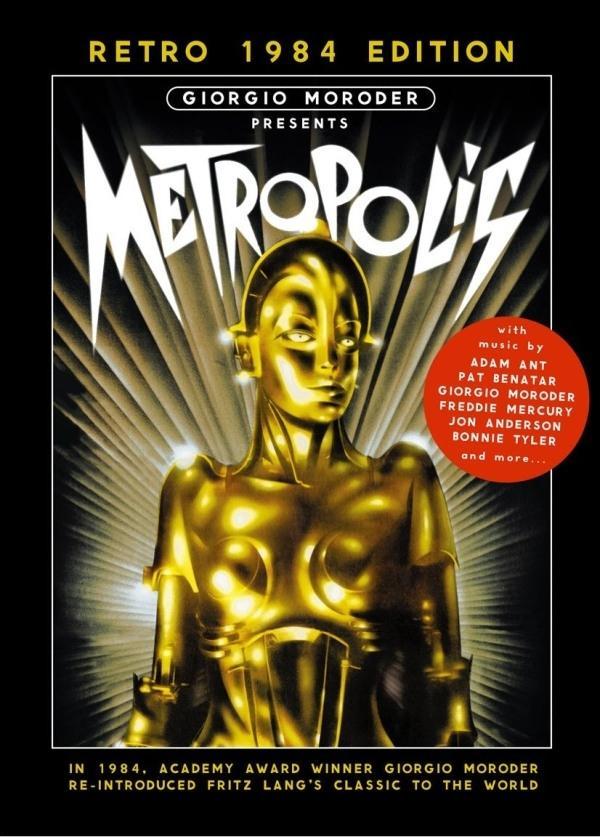

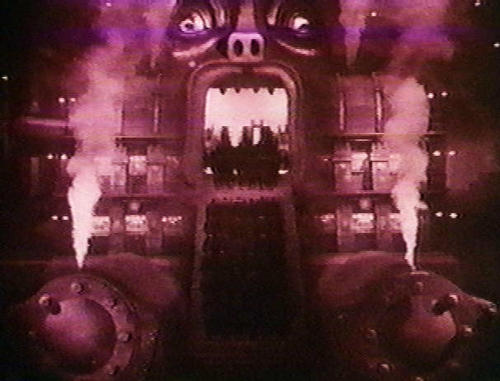
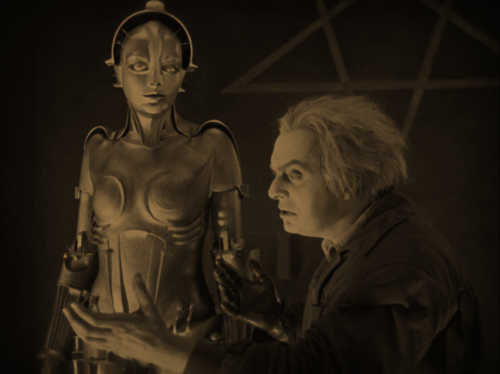

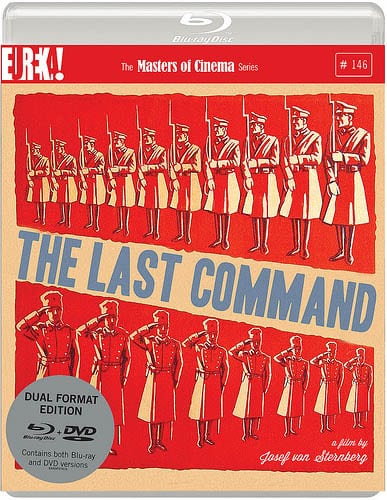
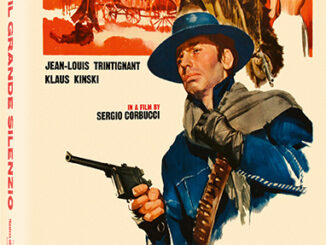
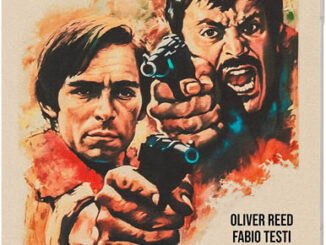
Absolutely loved this version when it first came out – Fritz Lang was truly ahead of his time.